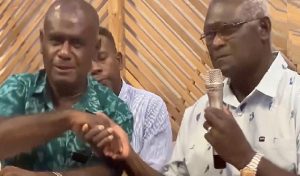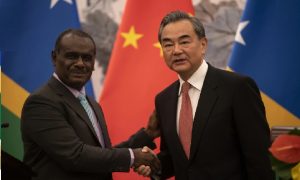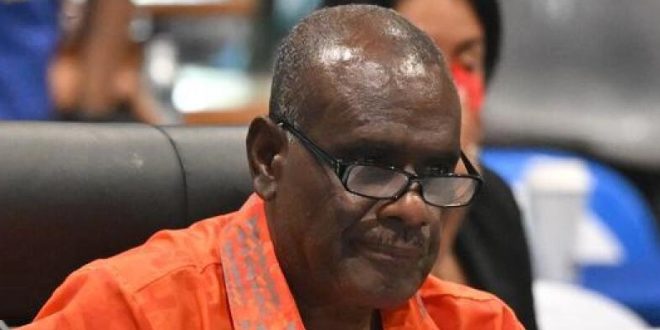03-05-2024
HONIARA: Solomon Islands lawmakers selected a new prime minister in a secret ballot on Thursday, choosing foreign minister Jeremiah Manele, who has pledged to continue the Pacific Island nation’s foreign policy that saw it grow close to China.
Governor General Sir David Vunagi announced outside parliament house that Manele had won 31 votes, to Opposition leader Matthew Wales’ 18 votes.
 Police have boosted security in the capital Honiara as newly elected lawmakers arrived at parliament on Thursday to vote.
Police have boosted security in the capital Honiara as newly elected lawmakers arrived at parliament on Thursday to vote.
A national election last month failed to deliver a majority to any political party, and two camps lobbied to win support from independents ahead of the vote for prime minister. The election is being closely watched by China, the US and neighboring Australia because of the potential impact on regional security, after incumbent Prime Minister Manasseh Sogavare struck a security pact with China in 2022.
Sogavare, who built close ties with Beijing during five years in power, did not seek re-election to the top political office and his party backed Manele.
Manele said outside parliament on Thursday “the people have spoken”, and called for calm, noting a history of violence in Solomon Islands after elections.
“Today we show the world we are better than that we must respect the democratic process for electing our prime minister,” he said.
The economy was slowly recovering from the COVID-19 pandemic and 2021 anti-government riots, and the government would soon unveil tax, forestry and minerals policies, he added.
Manele’s OUR party, which has pledged to build more infrastructure, won 15 seats, and gained four seats under a renewed coalition with two micro parties. It needed support from independents to reach 26 seats for a majority in the 50-seat parliament. A total of 49 votes were cast with one lawmaker absent.
 Manele is a former diplomat who entered parliament in 2014, and travelled to China as foreign minister in 2019 to formalise Solomon Islands’ switch in diplomatic ties from Taiwan to Beijing.
Manele is a former diplomat who entered parliament in 2014, and travelled to China as foreign minister in 2019 to formalise Solomon Islands’ switch in diplomatic ties from Taiwan to Beijing.
On Monday, Manele said he would keep the “same foreign policy basis – friends to all and enemies to none”. Lowy Institute research fellow Mihai Sora, a former Australian diplomat in the Solomon Islands, said Manele has “a strong track record of working well with all international partners”, compared to Sogavare who was “a polarizing figure”.
Australian National University’s Pacific expert Graeme Smith said Manele was capable and “a big change in style” for the Solomon Islands.
Manasseh Sogavare, the Solomon Islands prime minister who drew his nation close to China, sharpening the United States’ focus on the strategic importance of the Pacific Islands, has bowed out of the race for leader after an inconclusive election.
Sogavare is known for his unpredictable diplomacy. He criticized neighbor Australia, snubbed a White House meeting with Pacific leaders because he said he wanted to avoid a lecture, and declared “I’m back home” while stepping off a plane in Beijing a few months later.
At election rallies, Sogavare said he had put Solomon Islands on the map by striking a security pact with China. Yet he only narrowly won his East Choiseul seat during Wednesday’s vote, as opposition parties highlighted how health services ran out of medicine as Beijing built sporting stadiums.
“He has bowed out because of the poor performance of his party,” said Australian National University Pacific expert Graeme Smith.
Solomon Islands lawmakers will vote for a prime minister on Thursday, and Sogavare’s party, which lost half its seats, has nominated former Foreign Minister Jeremiah Manele as its candidate. (Int’l Monitoring Desk)
 Pressmediaofindia
Pressmediaofindia




